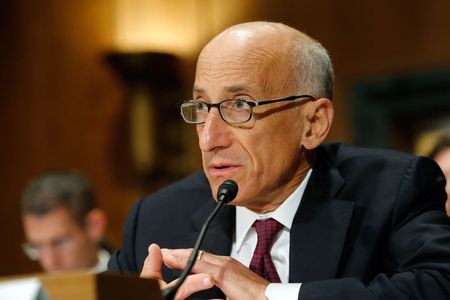By Douwe Miedema
WASHINGTON (Reuters) - A top U.S. regulator said on Wednesday he would welcome a delay by the European Union that gave more time to resolve a conflict with Washington over making derivatives markets safer.
Reuters reported last week that the EU is discussing whether to move a deadline by which U.S. clearing houses, which act as go-betweens for buyers and sellers, must meet EU rules when doing business there.
"I am encouraged by that flexibility ... it's very important as we deal with this not to disrupt the market," Tim Massad, the head of the Commodity Futures Trading Commission derivatives regulator, told Reuters in an interview.
At the moment, Europe is sticking to its own rules for U.S. clearing houses rather than exempting them as it plans to do with Japan, Hong Kong and Australia, for example. Brussels has refused to grant similar treatment to the United States as long as the CFTC does not exempt European clearing houses.
The current deadline is Dec. 15, after which new capital requirements kick in, making it prohibitively expensive for European banks to do business with U.S. clearing houses.
"I expected it would be maybe easier to get this done," Massad said. "(It's) an exercise we're going through now. And I'm willing to explore (whether the U.S. can rely on EU rules to a greater extent)."
Swaps are derivatives that were originally designed to protect companies and investors against financial risks. However, their use ballooned in the heady days leading up to the 2007-09 financial crisis when speculators started jumping into the then unregulated market.
They can be packaged into highly complex transactions, and they played a major role during the financial meltdown as insurance firm American International Group Inc suffered massive losses when risky derivatives bets went sour.
European regulators and the CFTC are cracking down on the market as part of a global agreement that followed the crisis, but have bickered over the supervision of foreign entities.
Some of the U.S. rules for how clearing houses protect customer funds are crucial for the CFTC because they guarantee that clients do not lose their money if a firm goes under, Massad said. But the CFTC could give in where there was "no strong supervisory interest," for instance for non-U.S. clients doing business with these firms in the United States.
The CFTC was still considering exempting foreign clearing houses from the U.S. rules, Massad said, but that would only be valid for large banking clients and not for others such as asset managers. That might not go far enough for Europe, according to a recent letter by an industry group.
That rule would not precede a deal with the EU, Massad said.
"I think we're more focussed on working out this immediate issue with Europe," he said.
The CFTC would also soon seek market input on its plans to extend the number of products that need to be cleared, he said. At the moment four types of interest-rate swaps and two kinds of credit default swaps need clearing.

The new products could include interest-rate swaps in other currencies and non-deliverable forwards, he added.
(Reporting by Douwe Miedema. Editing by Andre Grenon)
